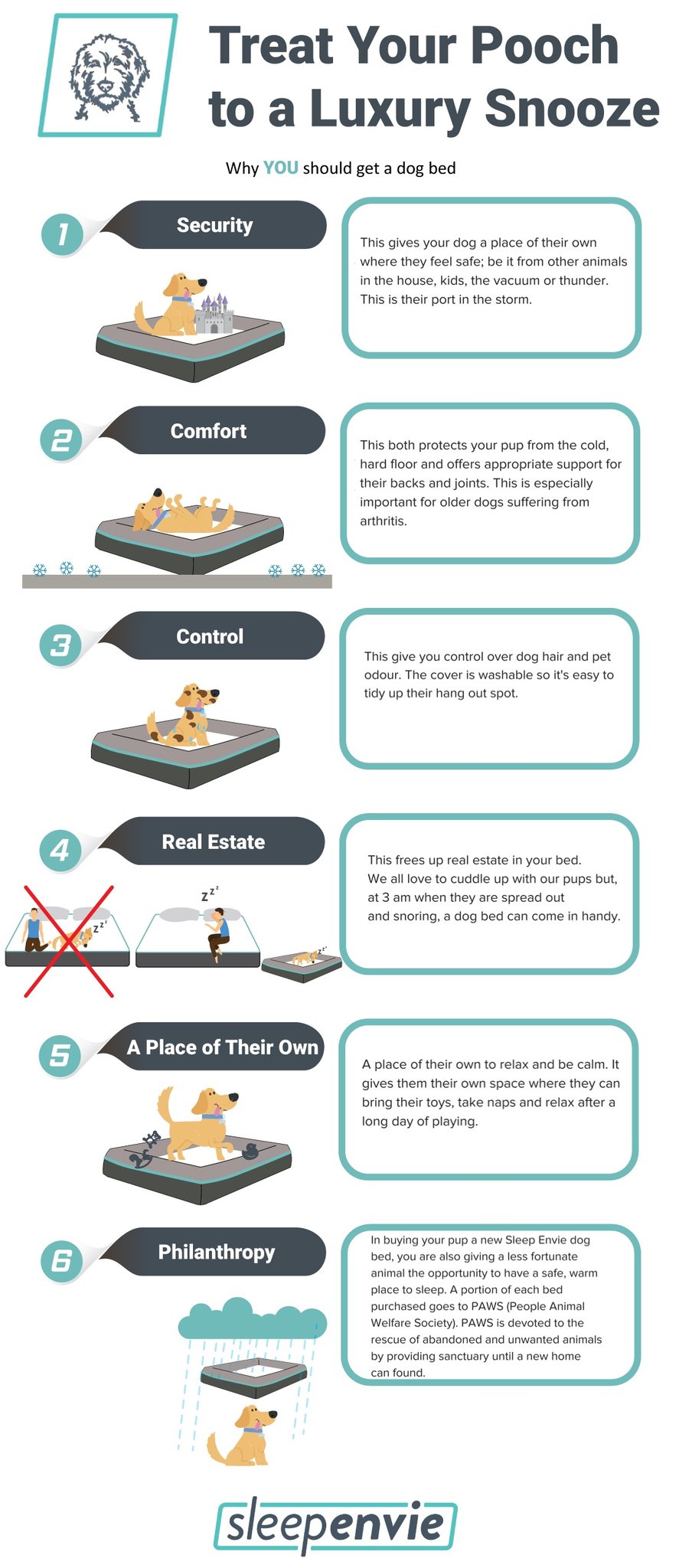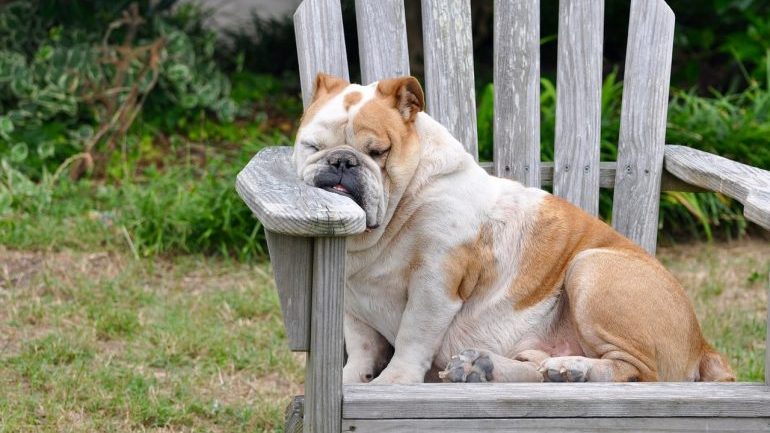How Much Do Dogs Sleep: Know Your Pet’s Sleep Habits
written by / July 31, 2019

Are you a new pet owner? Has a little furry baby arrived at your home or have you adopted an adult dog? Either way, now you are responsible for its wellbeing. But don’t panic! Taking care of your new friend isn’t that complicated as it seems. Just like human babies, they need lots of love and everything else will come naturally. Of course, make sure they always have access to water and feed them regularly. It’s also normal if you have a ton of questions. How much do dogs sleep and how can I help them feel more comfortable are probably just some of them.
Although you don’t need to sing lullabies to make your puppy fall asleep, there are some things you can do to improve its slumber. And as you’ll quickly notice, if you haven’t already, dogs tend to sleep a lot. So let’s first discuss how much sleep is normal for your pet and why it spends so much time resting.
How Many Hours a Day Do Dogs Sleep
You might think that your dog spends too much time sleeping, but in fact, that’s considered normal in the dog world. The man’s best friend typically spends 50% of the day dozing, 30% of the time lying around, and being active accounts for only 20% of their day.
Generally, dogs need 12 to 14 hours of slumber every day. However, this is the average amount of sleep and you don’t have to necessarily worry if your tail-wagger snoozes a bit more or less than this. There’s no straightforward answer to the question: “How much do dogs sleep a day?” The answer depends on several factors, including their age, breed, and health. We’ll talk about each of these factors in more detail below.
Dog’s Age and Sleep
- Puppies, just like babies, need lots and lots of sleep. On average, they snooze for 18 to 20 hours a day. Apparently, growing and exploring the world around them is not an easy task, so expect a dog nap or two… or a dozen throughout the day.
- Adult dogs, as we already said, sleep between 12 and 14 hours every day. So the amount of sleep they need to recoup their energy decreases as they get older. Still, there are some variations among dogs. Don’t forget that how much sleep is normal for dogs will depend on their size and activity levels, as you will see if you keep on reading.
- Older dogs tend to sleep more than they used to when they were younger. It seems that the relationship between age and sleep is a bit different among our canine friends compared to humans. Your senior dog simply tires more easily and therefore needs more rest.
Dog Breeds That Sleep a Lot
Some dog breeds love dozing more than others. Generally, bigger breeds tend to spend more time sleeping than smaller ones. Some of the laziest dog breeds are bulldogs, mastiffs, greyhounds, and Saint Bernards. So if you like sleeping in and don’t want to change your habits, look for one of the breeds that’s famous for needing lots of zzz’s.
More Action, Less Sleep
Another factor that will affect your dog’s sleep needs is how active they are during the day. For example, working dogs that are bred to assist people in various ways spend less time snoozing. Since they perform physically and mentally demanding tasks on a daily basis, they don’t have much time for taking naps.
Siberian Huskies, Labradors, German Shepherds, Border Collies, and other dogs bred to be working dogs belong to the most active dog breeds. They are naturally energetic, love to run and play, so they are a perfect fit for active people who like to be on the move.
On the other hand, dogs that don’t have to manage cattle, rescue people, help their disabled owners or complete other similar tasks as part of their job can just laze around. When they have nothing to do, most dogs tend to snooze more.
Life Changes Affect Canine Sleep Time
Any change in their daily routine can influence dog sleeping habits. For example, if you start working longer hours, they might sleep more because they don’t like being alone or just feel bored. Also, big life changes, such as the death of a companion or moving to a new home, can greatly affect your dog’s sleep schedule.
Similarly to humans, dogs are sensitive to the things happening around them and sleep can help them overcome all the difficulties they face. Other situations that your canine can find stressful are the arrival of a new pet or a baby. So try to understand it and give it some time until it gets back to normal.
Health Problems
Although we said that there is more than one way to answer how much do dogs sleep, there are certain cases when sleeping more than usual can be a warning sign. If you notice that all of a sudden your doggy is lethargic and sleeps excessively, you should know that its lack of energy can be a symptom of several illnesses.
In this case, your little fellow will probably show other symptoms as well. Of course, it’s best that you take it to the vet to get the right diagnosis and adequate treatment. Here are some of the health issues that cause excessive sleeping in dogs:
- Hypothyroidism
- Diabetes
- Anemia
- Infections
- Poisoning
- Depression
So if your otherwise cheerful and active dog suddenly becomes tired, go to the veterinarian who will be able to determine the cause of it and find the best solution.
Sleep Patterns in Dogs
Just like humans, when dogs fall asleep, they go through several different stages of sleep. The first one is slow-wave sleep or deep sleep, in which their blood pressure drops, while their heart rate and breathing slow down. They spend only about 10 minutes in this phase, after which they enter REM (rapid eye movement) sleep. If you see a dog twitching in sleep, it is probably in this stage dreaming of chasing a ball or a neighbor’s cat. Looking closely at a dog in the REM phase, we can notice that its eyeballs roll under the eyelids.
While this is another similarity between dogs’ sleep and ours, there’s one big difference. They spend considerably less time in this stage of the sleep cycle. In total, REM sleep accounts for about 10% of their sleep, while we spend about 25% of sleep in REM. So this is a possible answer to the question of why do dogs sleep so much. Many scientists believe that dogs need more sleep during the day to make up for lost REM.
Dogs and their owners also greatly differ in their sleep schedules. While people typically sleep for 7 to 9 hours at once and then they stay awake for 15 to 17 hours, our furry friends snooze for only about 15 minutes and stay awake for 5 minutes. Since they are naturally always on the alert, they don’t sleep as deeply as humans and can wake up more easily.
Why Does My Dog Sleep So Much?
Spending most of the time on dozing is a part of a normal canine lifestyle, so usually, there’s no reason to worry. However, if your Fido sleeps more than usual and seems lethargic, pay attention to other symptoms, such as a change in appetite, skin problems, weight gain or loss. As we already mentioned, a number of health problems can lead to a decrease in energy levels. Therefore, it’s best to consult your vet to identify the cause of your dog’s lethargy.
Also, don’t forget that some major events in your pet’s life can also affect the dog sleep schedule. If this is the case, its sleep habits should get back to normal after some time.
Finally, your furry pal might feel more tired during the day because it suffers from a sleep disorder.
Can Dogs Have Sleep Apnea and Other Sleep Disorders?
Although sleep disorders are generally not that common among our canine friends, they can have certain sleep problems. Waking up frequently, being sluggish during the day, or showing changes in behavior are all signs of sleep disorders. Some of the more common sleep disorders are the following:
- Insomnia in dogs is usually caused by another medical issue. Therefore, it’s recommended to visit a vet who will determine the underlying reason for this sleep disorder or even prescribe a sleep aid for dogs.
- Sleep apnea is most prevalent among obese dogs and some dog breeds with shorter snouts, such as Pugs and English Bulldogs. This sleep disorder can sometimes be the answer to the question: “Why do dogs snore?” However, snoring isn’t necessarily a sign of sleep apnea.
- Narcolepsy causes dogs to suddenly fall asleep after physical activity or excitement. Unfortunately, there’s no cure for this genetic disorder, but there are some ways to reduce the number of narcoleptic episodes.
- REM behavior sleep disorder causes physical activity during sleep and can be treated with certain medications.
Dog’s Sleeping Positions
Catching zzz’s throughout the day, your canine friend will probably change its sleeping positions. The following three are the most common.
- Sleeping curled in a ball is a defensive position. Although it’s the least comfortable, this position allows dogs to quickly react if needed. However, even if they feel safe, dogs tend to sleep like this to keep warm.
- When sleeping on the side, dogs expose some of their bellies, meaning that they feel safe and relaxed. Additionally, this position allows them to cool down a bit.
- A dog sleeping on its back shows that it feels absolutely safe and comfortable. It knows that its environment is secure and it completely trusts you since it’s not afraid to doze off in this extremely vulnerable position. Again, sleeping with its paws in the air helps it cool down if the weather’s too hot.
Tips for Improving Your Dog’s Slumber
There are some simple tips you can follow to help your loyal friend get the most out of its slumber:
- Choose your dog’s food carefully since its energy levels will depend on how much nutrients it gets. Sometimes dog sleep patterns may change depending on their nutrition.
- Give it as many opportunities as possible to be physically active – take it to walks regularly and organize playtime with other dogs.
- Don’t forget to take it to regular check-ups. This way, a vet is able to detect any early signs of a medical problem.
- Make sure your pet has a comfy place to rest. No matter if this is your bed, a crate, or a dog bed, it’s important that your dog sleeps at a dry and warm place. Below you can check out a cute infographic created by our friends from Sleepenvie, which lists all the reasons dog beds are a great choice for your furry pal.

Although pet owners often ask how much do dogs sleep, the quality of their slumber is equally important. Therefore, do your best to help your doggy get its restful shut-eye.
FAQs
How many hours does a dog sleep in a 24 hour period?
Typically, an adult dog sleeps 12 to 14 hours a day. However, puppies and older dogs usually need to get more zzz’s in order to function normally. Also, the amount of sleep they need depends on their activity levels, and their breed.
Why do dogs sleep so much during the day?
Scientists claim that dogs need more sleep than humans because they spend less time in the REM stage. Our canine friends sleep in bursts and wake up more easily, so it happens they don’t finish their sleep cycle. In a way, sleeping more during the day helps them compensate for the lost REM sleep time.
Why do older dogs sleep so much?
Just like elderly people, older dogs get tired more quickly, so they need more shut-eye to feel rested. It’s a normal part of the aging process that their energy levels decrease and there’s no need to worry if your senior pet sleeps more than it used to in its younger days.
Conclusion
So, how much do dogs sleep? Although the typical answer is 12 to 14 hours a day, normal sleep hours may differ from dog to dog. Therefore, take into account all the factors we’ve discussed before getting frantic if your pet likes to sleep in. Of course, it’s vital that you pay attention to its sleep habits so you can notice any changes on time. Restful sleep brings a range of health benefits to your tail-wagger and that’s why you need to help it restore its energy in the best way possible.










Warning: Undefined array key "format" in /home/602518.cloudwaysapps.com/cspedpjass/public_html/wp-content/themes/disturbmenot/template-parts/post-item/post-comment.php on line 23
Warning: Undefined variable $commenter in /home/602518.cloudwaysapps.com/cspedpjass/public_html/wp-content/themes/disturbmenot/template-parts/post-item/post-comment.php on line 27
Warning: Trying to access array offset on value of type null in /home/602518.cloudwaysapps.com/cspedpjass/public_html/wp-content/themes/disturbmenot/template-parts/post-item/post-comment.php on line 27
Warning: Undefined variable $commenter in /home/602518.cloudwaysapps.com/cspedpjass/public_html/wp-content/themes/disturbmenot/template-parts/post-item/post-comment.php on line 29
Warning: Trying to access array offset on value of type null in /home/602518.cloudwaysapps.com/cspedpjass/public_html/wp-content/themes/disturbmenot/template-parts/post-item/post-comment.php on line 29